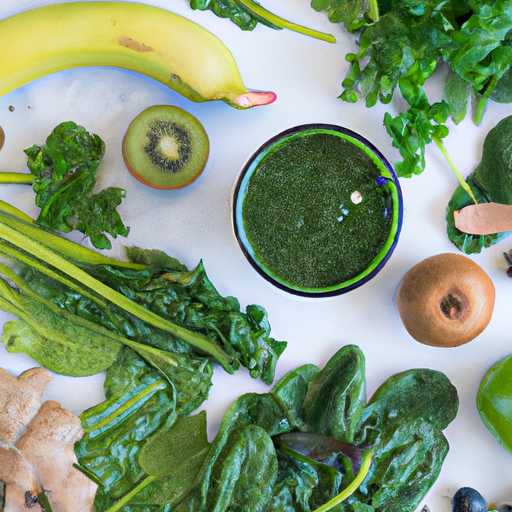Turmeric tea, a warm and soothing beverage, has gained popularity for its potential health benefits. But can it really help with a complex and chronic condition like ulcerative colitis? The answer might surprise you!
In recent years, there has been growing interest in the anti-inflammatory properties of turmeric, a vibrant yellow spice commonly used in traditional Indian cuisine. Research suggests that the active compound in turmeric, called curcumin, may have the potential to reduce inflammation in the body. This has sparked curiosity about whether turmeric tea could be a natural remedy for ulcerative colitis, a form of inflammatory bowel disease that causes inflammation and ulcers in the digestive tract.
In this article, we will explore the scientific evidence behind turmeric tea and its potential benefits for ulcerative colitis. So, grab a cup of turmeric tea and let’s dive into the research!
Key Takeaways
- Turmeric tea contains curcumin, which has anti-inflammatory properties that may help reduce inflammation in the body, making it a potential natural remedy for ulcerative colitis.
- Turmeric tea contains curcuminoids and antioxidants, which may promote the growth of beneficial gut bacteria and help reduce symptoms of ulcerative colitis.
- It is important to consult a healthcare professional before incorporating turmeric tea into the management plan for ulcerative colitis, as there may be potential side effects such as stomach upset and allergic reactions.
- Turmeric tea should not replace prescribed medications for ulcerative colitis, and limited scientific evidence specifically on turmeric tea and ulcerative colitis exists, so it is crucial to discuss new therapies with a healthcare provider.
Understanding Ulcerative Colitis
One way to gain a better understanding of ulcerative colitis is by learning about its symptoms and how they can vary from person to person.
Ulcerative colitis is a chronic inflammatory bowel disease that primarily affects the colon and rectum. Common symptoms include abdominal pain, diarrhea, and rectal bleeding. However, the severity and frequency of these symptoms can differ greatly among individuals. Understanding the symptoms is crucial for the diagnosis and management of this condition.
Treatment options for ulcerative colitis may include medications to reduce inflammation, such as corticosteroids and immunomodulators, as well as lifestyle changes and dietary modifications. It is important to consult with a healthcare professional to determine the most appropriate treatment plan.
Now, let’s delve into the subsequent section about the anti-inflammatory properties of turmeric.
The Anti-Inflammatory Properties of Turmeric
Surprisingly, the golden elixir possesses powerful anti-inflammatory properties that can alleviate symptoms of the chronic bowel disease. Turmeric tea has been found to contain compounds known as curcuminoids, which’ve been shown to have anti-inflammatory effects. These compounds work by inhibiting certain inflammatory pathways in the body, reducing the production of inflammatory molecules.
Additionally, studies have shown that curcuminoids can suppress the activation of immune cells that contribute to the inflammation seen in ulcerative colitis. Turmeric tea also contains antioxidants, which can help protect against oxidative stress and further reduce inflammation.
To reap the benefits of turmeric tea, you can easily make it at home using turmeric powder, ginger, and other spices. Incorporating turmeric tea into your daily routine may provide relief from the symptoms of ulcerative colitis. Furthermore, research on turmeric tea and its effects on ulcerative colitis is ongoing, with promising results.
Research on Turmeric Tea and Ulcerative Colitis
I’ve found several studies investigating the potential benefits of turmeric tea for ulcerative colitis. These studies have reported some positive findings, suggesting that turmeric tea may have anti-inflammatory effects. It could potentially help manage symptoms of ulcerative colitis. However, it’s important to note that the research in this area is still limited. More studies are needed to fully understand the effects of turmeric tea on ulcerative colitis.
Studies investigating the potential benefits
Numerous studies have explored the potential benefits of turmeric tea for ulcerative colitis. These studies have uncovered several noteworthy findings:
-
Anti-inflammatory properties: Turmeric contains a compound called curcumin, which has been shown to reduce inflammation in the body. This could potentially help alleviate symptoms of ulcerative colitis.
-
Improved gut health: Turmeric tea has been found to promote the growth of beneficial bacteria in the gut, which can enhance digestion and overall gut health.
-
Symptom relief: Some studies suggest that turmeric tea may help reduce symptoms such as abdominal pain, diarrhea, and rectal bleeding in individuals with ulcerative colitis.
It is important to note that while these studies provide promising results, more research is needed to fully understand the benefits of turmeric tea for ulcerative colitis. Additionally, potential side effects and dosage recommendations should be carefully considered.
Moving forward, we will examine the positive findings and limitations of the research in this field.
Positive findings and limitations of the research
Discover the exciting benefits of turmeric tea for managing symptoms of ulcerative colitis and the limitations of current research findings. While some studies suggest that turmeric tea may have positive effects on ulcerative colitis, it is important to acknowledge the limitations of the research. One study found that turmeric tea reduced inflammation and improved symptoms in participants with ulcerative colitis. However, this study had a small sample size and lacked a control group. Additionally, there is limited research on the long-term effects and safety of turmeric tea for ulcerative colitis. It is important to note that turmeric may have potential side effects, such as stomach upset and allergic reactions. Therefore, before incorporating turmeric tea into your management plan, it is advisable to consult with a healthcare professional. In the next section, we will explore how to prepare turmeric tea.
How to Prepare Turmeric Tea
To prepare turmeric tea, I start by boiling 2 cups of water in a saucepan. Then, I add 1 teaspoon of turmeric powder and let it simmer for about 10 minutes.
Finally, I strain the tea into a cup and add a squeeze of lemon juice for taste. It’s important to note that adding a pinch of black pepper can enhance the absorption of the turmeric’s active compound, curcumin, which has been shown to have potential anti-inflammatory properties.
Recipe and instructions for making turmeric tea
Ready to whip up a delicious cup of turmeric tea that may potentially help with ulcerative colitis? Turmeric tea is not only a flavorful beverage, but it also offers numerous health benefits. The recipe for turmeric tea is simple and can be easily prepared at home. Here is a quick and easy recipe to get you started:
| Ingredients | Instructions |
|---|---|
| 1 teaspoon of turmeric powder | Boil water in a saucepan |
| 1/4 teaspoon of black pepper | Add turmeric powder and black pepper |
| 1 teaspoon of honey (optional) | Simmer for 10 minutes |
| 1/2 teaspoon of ginger (optional) | Strain the tea into a cup |
| 1 cup of water | Add honey and ginger if desired |
Turmeric tea is known for its anti-inflammatory properties, which make it a potential aid for ulcerative colitis. However, it’s important to note that more research is needed to fully understand its effectiveness. Now, let’s move on to the next section for some tips on enhancing the taste and absorption of turmeric tea.
Tips for enhancing its taste and absorption
Looking to maximize the flavor and benefits of your turmeric tea? Here are some tips to make it even more enjoyable and boost its absorption in your body.
-
Add a pinch of black pepper: Black pepper contains piperine, a compound that enhances the absorption of curcumin, the active ingredient in turmeric.
-
Pair it with healthy fats: Curcumin is fat-soluble, so consuming it with healthy fats like coconut oil or almond milk can increase its absorption.
-
Use a natural sweetener: Turmeric tea can have a slightly bitter taste, so adding a natural sweetener like honey or stevia can enhance its flavor.
-
Experiment with spices: Adding spices like ginger, cinnamon, or cardamom can not only improve the taste but also provide additional health benefits.
By following these tips, you can enhance the flavor of your turmeric tea and increase its absorption in your body. In the next section, we will explore the potential benefits of turmeric tea for ulcerative colitis.
Potential Benefits of Turmeric Tea for Ulcerative Colitis
Turmeric tea can be a flavorful and soothing beverage that may have potential benefits for managing symptoms of ulcerative colitis. According to research, turmeric contains a compound called curcumin, which has anti-inflammatory properties that could help reduce inflammation in the colon, a key factor in ulcerative colitis. However, it is important to note that more studies are needed to fully understand the effects of turmeric tea on ulcerative colitis. When consuming turmeric tea, it is recommended to start with a small dosage and gradually increase it to avoid potential side effects such as stomach upset or diarrhea. It is also advisable to consult with a healthcare professional to determine the appropriate dosage for individual circumstances. Moving forward, it is important to consider other considerations and precautions when using turmeric tea for ulcerative colitis management.
Other Considerations and Precautions
Before you start incorporating turmeric tea into your ulcerative colitis management plan, it’s important to consider other factors and take necessary precautions. While turmeric tea has shown potential benefits for reducing inflammation and improving symptoms in some studies, it isn’t a cure-all and may not work for everyone.
Additionally, it’s crucial to be aware of potential side effects and interactions with medications. Some people may experience digestive issues like nausea, diarrhea, or stomach upset when consuming turmeric tea. It may also interact with blood thinners and certain medications, so it’s important to consult with your healthcare provider before adding it to your routine.
Furthermore, turmeric tea should not replace other treatments recommended by your doctor. When used as part of a comprehensive treatment plan, turmeric tea may provide some relief for ulcerative colitis symptoms.
Incorporating Turmeric Tea into a Comprehensive Treatment Plan
Incorporating turmeric tea into my treatment plan for ulcerative colitis has been a beneficial complementary approach. Research suggests that the active compound in turmeric, curcumin, may have anti-inflammatory properties that can help manage symptoms. However, it’s important to note that turmeric tea shouldn’t replace traditional medical treatments, but rather be used in conjunction with them.
Additionally, maintaining a balanced diet and making lifestyle modifications, such as reducing stress and getting regular exercise, are crucial in managing ulcerative colitis effectively.
Using turmeric tea as a complementary approach
Consider trying turmeric tea as a complementary approach to help manage your symptoms of ulcerative colitis. While there is limited scientific evidence specifically on turmeric tea and ulcerative colitis, turmeric contains a compound called curcumin, which has shown anti-inflammatory properties in studies. Inflammation plays a key role in ulcerative colitis, so incorporating turmeric tea into your comprehensive treatment plan may provide some relief.
To help you understand the potential benefits of turmeric tea, here is a comparison table highlighting some complementary therapies and alternative treatments:
| Complementary Therapies | Alternative Treatments |
|---|---|
| Probiotics | Acupuncture |
| Fish oil supplements | Yoga |
| Aloe vera | Herbal remedies |
Remember, turmeric tea should not replace your prescribed medications, but it may complement your current treatment. It’s important to discuss with your healthcare provider before incorporating any new therapies. Next, we’ll explore the importance of a balanced diet and lifestyle modifications in managing ulcerative colitis.
The importance of a balanced diet and lifestyle modifications
As a complement to using turmeric tea for ulcerative colitis, it’s crucial to focus on a balanced diet and lifestyle modifications. Research has shown that maintaining a balanced diet can play a significant role in managing ulcerative colitis symptoms. This means consuming a variety of nutrient-rich foods such as fruits, vegetables, whole grains, lean proteins, and healthy fats.
In addition, certain lifestyle modifications can also contribute to the overall management of this condition. Regular exercise, stress reduction techniques, and getting enough sleep are all important aspects to consider. These lifestyle modifications can help reduce inflammation in the body and support the healing process.
While turmeric tea may have potential benefits, it’s important to remember that it should be used in conjunction with a well-rounded approach that includes a balanced diet and lifestyle modifications.
Frequently Asked Questions
Can turmeric tea completely cure ulcerative colitis?
While turmeric tea has shown potential benefits for ulcerative colitis, it is important to note that it is not a cure. It can be used as a complementary therapy alongside other treatment options for managing symptoms.
Are there any potential side effects of consuming turmeric tea for ulcerative colitis?
There are potential risks and adverse reactions associated with consuming turmeric tea for ulcerative colitis. It is important to consult with a healthcare professional before incorporating it into your treatment plan.
How long does it take for turmeric tea to show its benefits in ulcerative colitis?
The duration of turmeric tea benefits in managing ulcerative colitis varies among individuals. While some may experience relief within a few weeks, others may take longer. Scientific evidence supports the effectiveness of turmeric tea in managing symptoms of ulcerative colitis.
Can turmeric tea be used as the sole treatment for ulcerative colitis?
Turmeric tea can be a complementary treatment for ulcerative colitis, but it should not be used as the sole treatment. There are alternative treatments available, and while turmeric tea may be effective for other digestive disorders, its effectiveness for ulcerative colitis is still being researched.
Are there any specific dietary restrictions or precautions to keep in mind while consuming turmeric tea for ulcerative colitis?
While consuming turmeric tea for ulcerative colitis, it is important to be mindful of any dietary restrictions or precautions. Although turmeric tea has potential benefits, it is not a sole treatment or cure for the condition. Side effects may occur.
Conclusion
In conclusion, incorporating turmeric tea into a comprehensive treatment plan for ulcerative colitis may offer potential benefits. The anti-inflammatory properties of turmeric have been studied and show promise in reducing inflammation in the digestive system.
Symbolically, turmeric tea can be seen as a soothing balm, calming the storm within. However, it’s important to note that individual results may vary, and turmeric tea shouldn’t be used as a sole treatment. Consult with a healthcare professional to determine the best approach for managing ulcerative colitis.










